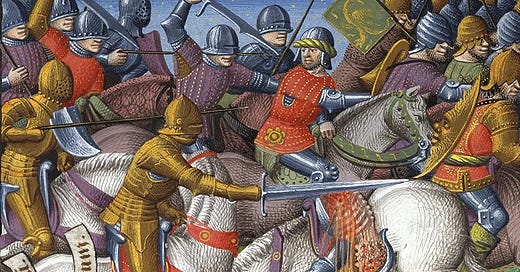If you are looking for the beginning of the study for The Song of Roland then you can go HERE for a brief introduction. At the bottom of the introduction you will find the links to each section of the study guide as it becomes available. If you would like to see the growing list of book studies available for free on this site you can go HERE. Enjoy!
Virtues/Vices/Great Ideas: (Find them in the Text)
Despair, Courage
Grammar Questions: (The Information of the Text)
What did Charlemayn remember that Roland had said?
What did Carlon (Charlemayn) do when he found Roland’s dead body?
Who did Charlemayn say would “rise up against” his rule?
What did Charlemayn ask “God that lay on Mary’s breast” that he might do for him?
What was suggested by Geoffrey d’Anjou concerning the burial of the French soldiers?
What special treatment were Roland, Oliver, and Turpin given in their burial?
How many Columns were the French soldiers organized into?
Name the leader of each of the 10 columns and state how many men he had under his command.
What was the last thing Charlemayn did as part of his preparation to meet the Paynims in battle?
Logic Questions: (Interpreting, Comparing/Contrasting, Reasoning)
Why might the French have slept in their armor but then taken it off in the morning?
Why did Carlon (Charlemayn) want to go before all of his men to find Roland?
Charlemayn said, “Thy wretched lord sent thee to Spain to die”? Compare this to what the Paynim Adelroth said in Laisse 93. Does Charlemayn agree or disagree with Adelroth?
Why did Charlemayn say, “my troubles and toils begin anew”?
What vice is expressed in Charlemayn’s prayer in Laisse 210?
What is the point or purpose of the extra measures which Charles (Charlemayn) took with the burial of Roland, Oliver, and Turpin?
What is meant by saying that Charles called on “him that bare the keys”?
What do you notice about the columns as they are called to order from one to ten?
Why might Charlemayn’s biblical references in his prayer be considered particularly on point for his present situation?
Rhetoric Questions: (The Analysis of Ideas in the Text)
Obviously traditions concerning the burial of our dead have been different over time due to various factors from geography to religious beliefs. In The Song of Roland we see Charlemayn do something to honor three of his fallen soldiers in their burial that might strike us as unusual. What do you think is the most fitting way we should care for the remains of those who die? Explain your answer with reason.
The French created one mass grave for their fallen soldiers, and Charlemayn particularly honored three of them while, presumably, they left their enemies bodies exposed to the elements. Should we bury all people with the same level of respect and dignity? Are some people worthy of more or less honor than others? What makes the difference? Is there a minimum responsibility we owe to everyone concerning the care of their remains (even our enemies)? Clarify your position and use good reasoning.
Theological Analysis: (Sola Scriptura)
Read Genesis 47:29-31 and Genesis 50:22-26. Why do you think it was so important to Jacob and Joseph that their remains not be buried for good in Egypt? What might we infer from their thinking on this matter about our own burials?
Read 1 Corinthians 15. What does this passage teach us (either directly or by inference) about the importance of the body, even after death? How should this affect our thinking about Christian burial practices?



